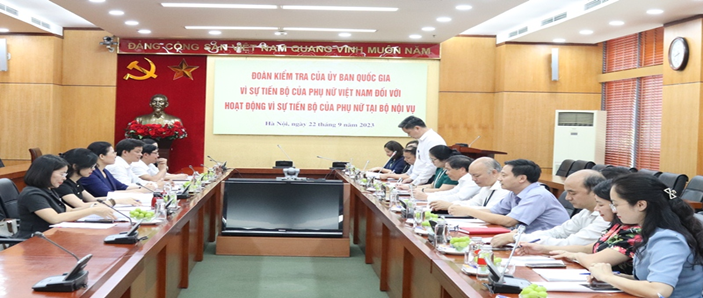Starting Point
On July 15, 2004, the Prime Minister issued Directive No. 27/TTg on strengthening activities for the advancement of women in ministries, ministerial-level agencies, government agencies, and People's Committees of provinces and centrally run cities, replacing Directive 646/TTg dated November 7, 1994.
There are four purposes and requirements for strengthening activities that aim to advance women. First, thoroughly understand and further strengthen the gender perspective and sense of responsibility across sectors and levels regarding gender equality and women's progress in national development. Secondly, establish an effective operating mechanism for mainstreaming gender issues into the policy-making and implementation process. Thirdly, create favourable conditions for women to exercise their basic rights and participate fully and equally in all areas of political, economic, cultural, and social life. Fourth, strengthening activities for the advancement of women, which are the responsibility of Party committees at all levels, authorities, unions, agencies, career organisations, and enterprises.
Peace Journey
The Government's activities for the advancement of women in various sectors, localities, and units include the following five tasks: thoroughly understand and fully implement the viewpoint of gender equality; develop and effectively execute the Action Plan (AP) for women's advancement; regularly monitor, encourage, and inspect the execution of the Party's guidelines, laws, and policies of the State concerning women in different sectors, localities, and units; disseminate the Party's guidelines, laws, and policies of the State on women and the United Nations Convention on the Elimination of All Forms of Discrimination Against Women (CEDAW) in a timely manner; and effectively build and maintain the apparatus for women's advancement.
The government also established an operating system in which the committee will be formed at various levels: within ministries, branches, and central agencies; under central ministries and branches; within enterprises; across provinces and centrally-run cities; within departments at provincial and city levels; and at communes, wards, and quarter levels. Each committee within the operating system has their own set of compositions and tasks. The committee's working regulations include guidelines for its formation, working relationships, operational conditions, annual work plan, inspection procedures, and reporting requirements.
Success Stories
The National Committee for the Advancement of Women of the Ministry of National Defence promotes innovation in the content and methods of information, education, and communication activities to raise awareness among officers, employees, soldiers, women’s union members, and other army personnel on gender equality. The Committee also encourages and facilitates the participation of both women and men in educational and communication activities related to reproductive health and access to health services. In addition, attention is given to effectively implementing relevant regimes and policies, and to fostering progressive, happy, and civilised families among officers, employees, soldiers, women’s union members, and workers in the Army.
In 2024, the proportion of female cadres planned for command and management positions reached 2.3% of all planned cadres — an increase of 0.9 percentage points from 2023. The proportion of female Party members participating in Party committees at all levels reached 4.12%, up 1.12 percentage points from 2023.
Across the entire army, there are 10 female People’s Artists, 3 female Meritorious Artists, and 2 Meritorious Teachers recognised by the Ministry of National Defence upon receiving noble State titles. Additionally, 55 female soldiers have served in United Nations peacekeeping missions, and one female officer has been promoted to the rank of general.

